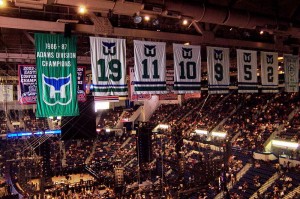The Seattle Coyotes. Doesn’t exactly roll off the tongue, does it?
Of course, were the Arizona Coyotes to exercise the out-clause of their arena lease and move to the Seattle area in time for the 2018-19 NHL season, the name would likely be changed to something aquatic (Orcas), nostalgic (Metropolitans) or culturally relevant (Totems). Just don’t call them late for dinner.
To consider the possibility, close your eyes and mentally rewind to just fifteen months ago.
The Coyotes ownership struggles came to a head in 2013

Although celebrated by all sides as ensuring the stability of the club, there is language within the lease that has the potential to turn the franchise on its ear in less than four years. Specifically, an out-clause that allows the team to break the lease if losses exceed $50 million over the first five years of the deal. That’s no small concern, and with a reported first-year loss of up to $24 million and the ink barely dry on the new lease agreement, the threshold is looming large.
There’s a chance the report is inaccurate. It’s also possible that the team will see its losses ebb over time. On the other hand, the team may well bleed red ink for the next several years and trigger the $50 million out-clause. If so, then what?
The Coyotes came within an eyelash of moving to Seattle in 2013
Most are familiar with the attempts Seattle has made to secure an anchor tenant for a proposed new arena, one which would house the potential return of the Seattle Sonics and an unnamed NHL franchise.
What they don’t necessarily know is exactly how close the Coyotes came to becoming that initial tenant.
“Most people don’t realize how close we were to actually getting an NHL team,” said Mike McGinn, the former Seattle mayor who was actively involved in the negotiations. “I understood that if Glendale didn’t proceed, that we could get an NHL team.”
Recent information has revealed that investment bankers Ray Bartoszek and Anthony Lanza would have purchased the Coyotes from the NHL and moved them to Seattle. Reportedly, trucks were on standby to relocate the team within days.
The case for a move to Seattle in 2018
For the record, Seattleites would far prefer an expansion NHL franchise to acquiring a team from another city. Those of us who suffered through the purchase and eventual move of the Sonics by Oklahoma oil baron Clay Bennett can relate to another city’s struggles to keep their team. However, despite expansion talk occasionally heating up in the media, both the NHL and NBA have thrown cold water on the notion, at least for now.
With the MOU between King County, the City of Seattle and Chris Hansen’s investment group set to expire in 2017, the wheels will need to be in motion by then so that the arena can break ground. The Phoenix lease out-clause and the expiration of the arena MOU fall within one year of one another. That’s close enough so that tweaks could be made as necessary to fit the jigsaw puzzle pieces together.
IceArizona recently announced that Philadelphia hedge fund manager Andrew Barroway will purchase 51% of the team, infusing much-needed cash into the team’s coffers. Does it also set the table for a future move?
Coyotes agree to sell controlling interest to Andrew Barroway http://t.co/zUS9TfMPr5 via @FoxSports #Coyotes #AndrewBarroway #NHL
— The Fan Daily (@the_fandaily) October 11, 2014
Consider the following:
– With 51% ownership, Barroway will hold majority control of the franchise.
– As an out-of-area investor, he is less likely to be motivated by emotion.
Although both Seattle and Phoenix are world-class cities, the tech-heavy economy of Seattle equates to more dollars, something that typically factors into the decision when local ownership doesn’t have a controlling interest. Furthermore:
– Seattle has a 40% larger economy
– Seattle’s median income is 47% greater
– More Fortune 500 companies are headquartered in Seattle than in Phoenix.
– More billionaires live in Seattle than in Phoenix.
From a media market perspective, the two cities rank 12th and 13th, respectively. However, at this time, there is simply more wealth concentrated in Seattle. That equals more corporate sponsorship, more advertising dollars, and ultimately, a higher franchise value.
What’s next?

With all that said, the prospects of an eventual move of the Coyotes to Seattle has to be considered within the realm of possibility. If it’s true that the NHL has no plans on the horizon to expand and if it is also true that the NHL considers the Seattle market to be a prime candidate for a new team, then how can the two arguments both be accurate at the same time?
They can’t. Either the league is playing both sides against the middle, or franchise relocation is the answer. I think I can speak for fans of both cities when I say we’d all rather see the Coyotes remain in the desert and a new expansion team be granted to the Emerald City. The Seattle Coyotes really doesn’t have much of a ring to it.